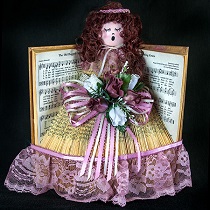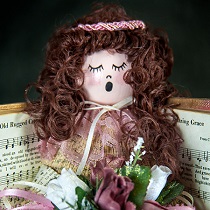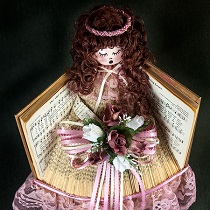Description of Figure/Doll
Female figure created from a hymnal on the page of the song, “The Old Rugged Cross.” The pages are folded to make an elaborate skirt for the woman. A lace ruffle is at the bottom of the dress. She is holding a bouquet of beautiful roses and ribbon. Her head is a wood bead with synthetic hair and a halo or headband.
Link to higher resolution images at ClipPix
Sierra Leone
Location: West Africa
Capital: Freetown
Main language: English
Currency: Sierra Leonean leone
Figure/Doll
Construction: Hymnal Book
Height in Centimeters: 25
Height in Inches: 10
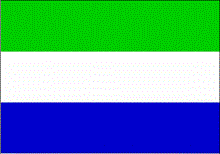
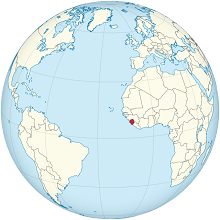
Freetown, Sierra Leone: A Refuge for Slaves and the Inspiration for Amazing Grace
Reading Level: 6.30
My name is Omar, and I live in Freetown, Sierra Leone. Sierra Leone is a country in western Africa. It is between Guinea and Liberia. Two hundred years ago, Africa was a prime target for slave traders. African people in this area were very good at growing crops, such as rice. That made them valuable as slaves in the British islands and America.
One of my ancestors, Musa, was caught, chained, and dragged onto a slave ship in 1753. The captain on the slave ship was John Newton from Great Britain. Musa was not sure he would survive the trip across the ocean. All of the slaves on the ship were chained below deck in a very crowded room. They had very little food or water. When they landed in America, Musa was sold to a white man in Virginia.
Life on the plantation was very difficult. Musa lived in a crowded shack, with little to eat. He was often beaten by his white “Master.” In 1776, a war broke out between the American colonists and the British rulers. The British offered black slaves a “safe haven” if they would help them fight. Musa ran away from the plantation in 1779 to help the British. In 1783, when the British lost the war, Musa was sent to live in Nova Scotia, Canada. Musa lived for several years as a free man in Canada. Then, in 1792, the British offered Musa and other previous slaves a chance to return Africa. Once back in Sierra Leone, they founded my city and called it Freetown.
John Newton
In 1759, John Newton stopped being a slave trader and returned to England. Then he studied religion and became a minister of God. He became a strong advocate for the end of slavery. He gave speeches and wrote: “I think I should have quitted [the slave trade] sooner had I considered it as I now do to be unlawful and wrong.” In 1770, he wrote the lyrics to the famous hymn Amazing Grace.
Amazing grace, how sweet the sound
That saved a wretch like me.
I once was lost, but now am found,
Was blind, but now I see.
John Newton died in 1807, shortly after the British government ended the slave trade. This finally stopped British ships from taking slaves out of Africa.

